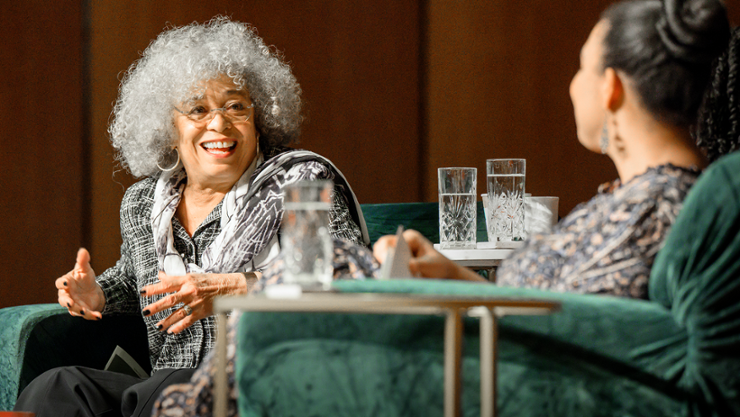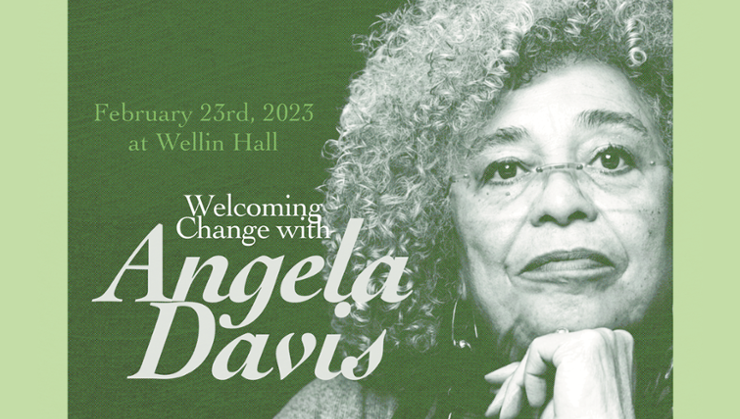
On Thursday, Feb. 23, civil rights activist Angela Davis took the Wellin Hall stage in Schambach Center to share her perspectives on some of the most contentious social issues plaguing our world today. Sipping her tea and cracking jokes, Davis brought just as much humor as expertise to the evening’s conversation. From social media to mass surveillance to the role of art in political movements, Davis commented on a range of political questions and wove her personal experience, breadth of knowledge and wit into every answer.
Davis began with a story about a student who took her class on incarcerated women at the University of California, Santa Cruz. In order to expose students to the realities of incarceration, Davis brought her class to the San Francisco County Jail and asked incarcerated women to teach students about their experience in the penal system. After the first session, one student stopped coming to class. Davis met with her and the student shared that she felt so devastated seeing people incarcerated, explaining that they deviated so greatly from what she had expected. She urged her to continue coming and the student finally agreed and “they had a great rest of the semester” according to Davis, who added that she would never forget that story. She explained that in instances like these, “ideological presumptions can militate against what we are trying to solve” in warning against this tendency to over-intellectualize issues, a tendency she deems a form of objectification.
When asked whether social media can be used as a resource for social change, Davis stated that we cannot think about a world without social media. She agreed that social media serves as a powerful avenue for political movements, but she also said that it has limitations that are important to recognize. In considering the role of institutions in social movements, Davis insisted that institutions will always have to be “pestered” and “pushed” and that this pressure brings about change. According to Davis, electing progressive officials is not enough. She urged that change comes from collectives of people and does not “emanate from powerful individuals.”
On the question of the role of aesthetics in political movements, Davis gave an incredibly moving response on the role of music in enacting social change. She said music allows us to feel “before there are words.” She explained that music has kept alive the struggle for freedom for Black people and harped on the importance of “collective listening.” Davis also discussed the role of visual art in political movements, particularly its use in visualizing abolition and the ways in which visual art allows us to envision solutions before we can verbalize them.

About 35 minutes into the conversation, Davis took a moment to say that some questions are simply better answered in the process of doing. She explained that in the world of academia, in “institutions like these,” as in here at Hamilton College, it is easy to develop a “very narrow sense of what counts as knowledge.” She explained that the first time she learned about the connection between slavery and incarceration was during her time in jail in a conversation with another incarcerated person. As she movingly expressed: “Don’t assume that institutions are the only venues for the production of knowledge.”
On the question of the role of Marxism in the future world, Davis triumphantly declared that “capitalism will come to an end.” She explained that “so long as capitalism persists, Marxism will be an important tool for understanding the nature of the capitalist system and how to dismantle it.”
To close out the evening, Davis was asked what brings her the most joy. She responded by saying “it is impossible to cultivate a movement that will have a lasting impact if those who create the movement cannot find joy in that struggle.” She eschews this notion that work is done here and fun is had somewhere else, and asserts the importance of finding fun in the act of resistance. Davis explained that she loved to read, think and write and urged us to ask ourselves “What brings you joy and how can you make that relevant to collective struggles for freedom?” In her final sentiments, Davis explained, in a capitalist world, we destroy in the process of creating. Davis invited us to compare ourselves to ants, a creature we have deemed “the lowliest of animals,” and their ability to build entire edifices all out of dirt.
















